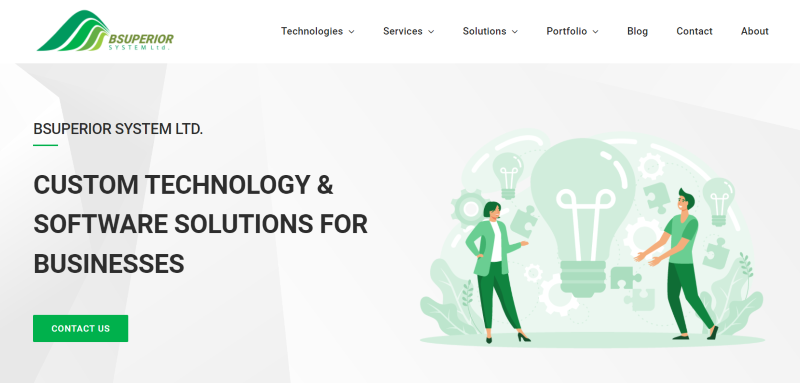To 10 Advantages of Custom Software Development
![Advantages the Custom Software Development Advantages the Custom Software Development [Top 10]](https://bsuperiorsystem.com/wp-content/uploads/2024/04/Advantages-the-Custom-Software-Development.jpg)
Table Of Content
In this blog post, we’ll tell you about an alternative approach which is custom software development. Tailored to a company’s specific requirements, custom software offers the potential to increase output and reduce long-term costs.
In what follows, we’ll be discussing:
- The fundamentals of custom software development
- Why businesses need a customized software solution
- The advantages and shortcomings of this approach
- A reliable custom software development vendor
What is Custom Software?
Custom software development describes the creation of software applications designed to address the specific needs of an individual client or organization.
This process shares similarities with developing off-the-shelf software, but with a key difference – custom solutions target a particular set of users rather than a broader audience.
Compared to off-the-shelf software, custom development offers a tailored approach that can address intricate business requirements. This method is applicable across various industries, including healthcare, finance, transportation, and many others.
Why Do Businesses Need a Custom Software Solution?
One key driver is customer demands. Since businesses are fundamentally driven by customer needs, custom software can be a critical tool to address those needs more effectively than off-the-shelf solutions.
Additionally, several factors can indicate when a business is likely to benefit from custom software. These factors include:
- Optimizing internal processes and workflows for efficiency
- Seamless integration with existing software systems
- Ensuring application speed and responsiveness
- Gaining a competitive advantage in the marketplace
- Maintaining the highest levels of data privacy and security
Custom software offers inherent efficiency gains because it’s designed specifically to address your business’s workflows. This targeted approach eliminates the need for workarounds or adaptations often required with off-the-shelf solutions.
Furthermore, custom software development grants you autonomy. By self-managing your own product, you avoid dependence on external vendors for updates or modifications.
While the initial investment in custom software may appear significant, long-term benefits can outweigh upfront costs. Integration expenses tend to be lower with custom solutions given that they are built to seamlessly connect with your existing infrastructure.
Advantages of Custom Software Development
One of the key advantages of custom software development is the level of control it offers. You have the flexibility to design the software exactly how you want it to function and visually appear.
Moreover, custom software can be easily expanded upon as new technologies or business needs emerge. This allows for a scalable solution that can grow alongside your company.
Below are some of the primary benefits of custom software development.
1. Tailored Solutions
One of the primary advantages of custom software is its ability to deliver unique solutions. It can be customized and adapted to address your specific business requirements and can be modified over time to accommodate evolving needs.
The level of customization offered by custom software development allows businesses to optimize their daily operations. It caters to specific needs, potentially leading to increased efficiency and improved profitability.
As a result, custom software development can be a valuable option for businesses seeking a tailored solution to achieve their goals.
2. Better Security
In contrast to off-the-shelf software which may not always prioritize ongoing security improvements as new threats emerge, custom software development offers greater control over security practices.
Developers can implement industry best practices and adapt to evolving security threats. This involves measures such as:
- Optimal Security Practices: Utilizing the latest security protocols and methodologies
- Access Control: Granular control over who can access sensitive data within the software
- Secure Data Storage: Implementing secure methods for storing and handling business data
- Agile Development: Faster development cycles allow for quicker integration of security updates.
- Risk Assessment: Proactive identification and mitigation of potential security vulnerabilities.
- Compliance: Ensuring adherence to relevant data security regulations.
By taking these steps, custom software development will offer a more secure environment for your business data.
3. Seamless Integration
Many businesses make use of multiple software solutions to manage different aspects of their operations.
To achieve optimal results, seamless communication and data exchange between these systems are extremely essential. Custom software development offers a significant advantage in this regard.
Since custom software is built specifically for your needs, it can be seamlessly integrated with your existing software infrastructure. This fosters improved internal visibility, meaning you have a clearer picture of your operations across different systems.
However, off-the-shelf software may not integrate flawlessly with your existing systems. Even if integration is possible, it might lack functionalities such as automated workflows or real-time data visibility that will potentially hinder efficient information flow within your organization.
4. Performance and Efficiency
Custom software development prioritizes creating high-performance and resource-efficient solutions that are tailored to your business needs.
In today’s fast-paced digital environment, exceeding expectations for speed and performance is crucial. Even minor delays can impact user experience and productivity.
Custom software is built with this mindset and takes advantage of efficient programming languages that optimize performance while minimizing resource consumption.
This focus on efficiency extends to eco-friendly practices as well, making the solution environmentally responsible. The result is a potential competitive advantage for businesses that use both technological advancement and environmental awareness.
5. Hardware Compatibility and Cost Savings
Off-the-shelf software licensing might require additional hardware purchases to ensure efficient operation that will potentially result in increased costs.
Custom software development offers a distinct advantage in this area. By considering your existing hardware capabilities during development, custom software can be designed to run efficiently without requiring additional hardware investments.
This aligns with the core principle of custom development – adapting the software to your business needs, not the other way around.
6. Easy to Operate
Custom software offers a significant advantage in user experience. Considering the fact that it is designed with your specific needs in mind, it typically includes only the functionalities your team requires.
This streamlined approach avoids the clutter and complexity which is often found in off-the-shelf software with a wide range of features.
A simplified interface translates to increased user productivity. Employees can focus on their core tasks without getting bogged down by navigating unnecessary features.
What’s more, by automating repetitive tasks, custom software can potentially contribute to cost reductions and improved profitability.
7. Vendor Independence and Long-Term Stability
Off-the-shelf software introduces a degree of reliance on the vendor. Factors such as pricing, terms of service, and the vendor’s future stability are beyond your control.
In the event of the vendor going out of business or discontinuing product updates, you will most likely encounter a time-sensitive scramble to find a new software solution.
Custom software development offers greater control and long-term stability. You can continue using and modifying the software as needed, with ongoing maintenance costs as the primary consideration.
Disadvantages of Custom Software Development
While custom software offers advantages, it’s important to acknowledge the potential drawbacks.
1. Higher Upfront Costs
Compared to off-the-shelf solutions, custom development typically requires a larger initial investment. This includes time and resources dedicated to all development stages, such as requirement gathering, documentation, testing, and quality assurance.
2. Development Time
Another shortcoming of custom software development is the time it takes to bring the software to the market. This can be a disadvantage for businesses that are seeking a quicker solution.
While off-the-shelf software is readily available for use, custom development can take quite a few months depending on project complexity.
The time investment for custom software involves:
- Clearly communicating specific requirements to your development team
- User testing and iterative development cycles to address any issues and achieve optimal functionality
While these steps will result in software tailored to your needs, they can lead to longer launch times compared to off-the-shelf solutions.
3. Technical Expertise Considerations
Custom software development often requires in-depth knowledge of the tools, technologies, and your specific industry domain.
While a reliable software vendor will be able to address these needs during development, you might require additional technical expertise within your team for ongoing maintenance and support.
On the other hand, off-the-shelf solutions are generally easier to manage and maintain, even without a dedicated team of technical specialists on your end.
This is due to the fact that pre-built software comes with established support structures and resources readily available.
4. Limited Visibility During Development
When outsourcing custom software development, choosing a highly skilled and reliable partner is crucial to manage risks and ensure a successful outcome. However, relying on an external team can limit your visibility into the internal development process.
This might make it challenging to stay up-to-date on the software’s progress, including feature implementations, updates, and future roadmaps.
For businesses that prioritize close involvement throughout development, in-house development or outsourcing with a strong focus on transparent communication will be a more ideal choice.
Custom Software vs. Off-the-Shelf Software
The primary distinction between custom and off-the-shelf software lies in their level of customization. Custom software is tailored to a company’s specific workflows and processes.
Off-the-shelf software, on the other hand, is pre-built and caters to a broader audience, potentially containing features that may not be relevant to your specific needs.
With that being said, let’s take a look at some of the main differences between these two software development approaches.
| Feature | Off-the-Shelf Software | Custom Software |
| Implementation Speed | Faster | Slower |
| Cost | Lower upfront cost | Higher upfront cost |
| Customization | Limited options | Highly customizable |
| Community Support | Larger user community | Smaller user community |
| Competitive Advantage | Limited | Potential for differentiation |
- Implementation Speed: Off-the-shelf software, being pre-built, offers faster implementation compared to custom development.
- Cost: Off-the-shelf software is generally more budget-friendly, with a predictable upfront cost. Custom software development may require additional investment for specific functionalities.
- Customization: Custom software excels in this area. It’s designed to address your specific needs and can be adapted to grow with your business. Off-the-shelf software offers limited customization options.
- Community Support: Off-the-shelf software often benefits from a larger user community, allowing you to access reviews and find solutions to common issues through user forums. Due to its limited user base, custom software may not have readily available user reviews or a dedicated support community.
- Competitive Advantage: Custom software can give your business a unique edge by incorporating functionalities that differentiate you from competitors.
The Custom Software Development Journey
To understand the key differences between custom and off-the-shelf software, let’s explore the typical custom software development process.
Step 1: Partner Selection
The foundation for a successful project is choosing the right software development partner. This company should not only align with your values but also possess the capabilities to deliver the solution you need.
Carefully evaluate proposals and development costs before selecting a partner. A formal software development agreement will then be established, outlining terms, responsibilities, and expectations for both parties.
Step 2: Goal Setting and Requirements Gathering
The development process starts with a crucial step which is understanding your unique needs. Through in-depth discussions, software developers will gather information about your specific requirements, business goals, and desired software outcomes.
This collaborative effort leads to a detailed project plan encompassing scope, development approach, programming languages, timelines, technology stacks, and resource allocation.
Step 3: Software Design
The next stage focuses on meticulous design and planning. This involves creating a detailed software map outlining functionalities, features, and user interfaces.
The design is customized to your specific needs and ensures a smooth and user-friendly experience. Through close collaboration and continuous client input, the development team can create a design that is both practical and visually appealing.
More importantly, the software’s architecture is defined, establishing a robust framework with a clear structure for all components and their interactions.
Step 4: Coding and Testing
Once the design and architecture are finalized, the development team moves on to building and thoroughly testing the software. Functional programming is implemented to translate the design into a working system while upholding quality standards.
The major goal of this stage is to make sure that the custom software runs flawlessly and offers a user-friendly experience. Before launch, rigorous testing is also conducted to identify and rectify any bugs or security vulnerabilities.
Step 5: Deployment and Ongoing Support
The final step involves deploying the software and providing ongoing maintenance. The software is officially released and becomes integrated into your business operations. Comprehensive documentation is created alongside deployment as well.
The documentation serves as a user and maintenance guide that details functionalities, configuration, and troubleshooting procedures. Moreover, it allows users to effectively utilize the software and developers to maintain and update the system efficiently.
The development team remains available for ongoing support and updates. This ensures the software remains relevant and effective, helping your business stay competitive.
By providing thorough user guides and training, companies will be able to maximize the value of their custom software, leading to a strong return on investment.
Is Custom Software the Right Choice For Your Business?
Custom software applications are a good fit for businesses with unique needs that off-the-shelf solutions can’t address or for those launching entirely new products. They offer potential benefits including:
- Reduced Long-Term Costs: Custom software can be more cost-effective in the long run compared to ongoing license fees for off-the-shelf solutions.
- Unmatched Customization: You have complete control over the design, functionality, and features to perfectly match your business needs.
- Enhanced Marketability: A custom solution can differentiate your business and give you a competitive edge.
- Proprietary Value: Custom software becomes a unique asset that adds value to your business.
Check out the following factors to help you decide if it’s the right approach for you.
Go Custom When:
- You need highly specific features to gain a competitive advantage.
- Integration and easy customization are crucial for your existing systems.
- High data security is a top priority.
- Automating repetitive tasks is essential for increased efficiency and cost reduction.
- The long-term return on investment justifies the initial cost.
- You can dedicate resources to the development process.
Off-the-Shelf Might Be Better When:
- Budget constraints limit custom development costs.
- Your business is small and doesn’t anticipate significant growth.
- Integration and security concerns are minimal.
What Are the Alternatives to Custom Software Applications?
Beyond custom software applications, businesses may consider off-the-shelf alternatives. These options, such as platform solutions or pre-configured software, offer some degree of customization at a lower cost point.
Off-the-shelf solutions can be ideal for businesses seeking a quick and budget-friendly implementation.
They come with pre-built features that address common business needs, allowing for faster deployment and lower upfront costs compared to custom development.
However, businesses with specialized workflows or unique requirements that pre-made software struggles to handle will probably find custom software development to be a more suitable choice.
Final Words
Custom software development offers a powerful differentiator for many businesses. It is a strategic investment, potentially yielding benefits in technology, cost, and time management.
A critical decision involves choosing between in-house development or partnering with an external vendor. For those seeking an external partner, a reliable and supportive software development outsourcing company can be a valuable asset throughout your business journey.
By partnering with a custom software development company, you can achieve faster business results and benefit from their success rate with other clients.
Here at BSUPERIOR, we understand that a one-size-fits-all solution rarely works for businesses. Each company has its specific needs, and for those seeking online growth, custom software development offers an affordable and efficient path forward.

Our custom software development services are designed to deliver software applications tailored to your specific business processes.
So, if you’re interested in exploring the benefits of custom software development, contact our team to discuss your specific requirements.
We value your input and believe this content may enhance our services. However, it's under review. If you see room for improvement, please use the "Report an issue" button below. Your feedback helps us excel.
Contact us today at –– and speak with our specialist.

![Offshore Software Development: Pros and Cons [Expert Guide]](https://bsuperiorsystem.com/wp-content/uploads/2024/04/Offshore-Software-Development.jpg)


